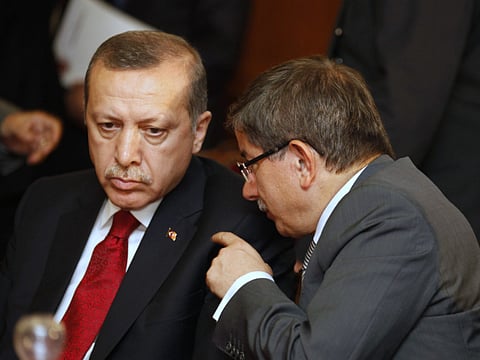Cracks appear in Turkey’s Erdogan-Davutoglu tandem
Davutoglu not the ‘puppet premier’ and president tries to chip away his powers in party and government

Istanbul: After over one-and-a-half years of cohabitation, cracks are emerging in Turkey’s ruling tandem of President Recep Tayyip Erdogan and Prime Minister Ahmet Davutoglu, sparking uncertainty over the premier’s future.
Many believed Davutoglu would be a puppet premier when Erdogan switched to the presidency in August 2014, but the former foreign minister has made conspicuous efforts to carve out his own profile, to the possible irritation of the combative head of state.
And last week’s decision by the executive committee of the ruling Justice and Development Party (AKP) to remove Davutoglu’s right to appoint regional party officials has been seen as a starting shot in a conflict to undermine his authority.
Potential successors, who could be more pliant for Erdogan, are lurking in the background including the president’s longtime henchman, Transport Minister Binali Yildirim, and the youthful Energy Minister Berat Albayrak, 38, who is married to the president’s eldest daughter Esra.
“There is inevitably a potential for clashes and these have begun to happen,” Ilter Turan, professor of political science at Bilgi University in Istanbul, told AFP.
“Obviously these are men of political ambition, so there is ample reason to think there is a substantial contention for power within the ruling party.”
Observers say the April 29 decision by the AKP executive committee to rob Davutoglu of a key power as party chairman marks a key moment for a party that always prided itself on unity since coming to power in 2002 after years of unstable coalitions.
“The historic executive committee meeting on April 29 was a turning point. In AK Party politics, there will be a before April 29 and an after April 29,” wrote Abdulkadir Selvi in the Hurriyet daily.
“A model of a powerful leader and a hard-working premier had been created. After April 29, an area of sensitivity has arisen in this relationship,” added the respected conservative commentator.
Turan said that while Turkey had a history of conflicts between presidents and prime ministers going back to the presidency of Turgut Ozal from 1989, “the AKP has so far been quite successful in not letting internal rifts develop in struggles for power.”
Turkish officials have always laughed off speculation of a rift between Erdogan and Davutoglu.
AKP spokesman Omer Celik denied there is any “crisis” in the party, describing the decision of the party’s MKYK executive committee as a “technical” move which Davutoglu had himself signed on.
“Although party officials commented this was a routine move, such an action was not taken by previous MKYKs,” said Ozgur Altug, chief economist at BGC partners in Istanbul.
Mild-mannered during his long stint as foreign minister, Davutoglu has undergone a transformation as premier, whipping up crowds with nationalist and religious-tinged rhetoric in sometimes ear-splitting speeches.
Erdogan, who served as premier from 2003 to 2014, meanwhile has sought to revamp the office of the president into Turkey’s indisputably number one post rather than a ceremonial role.
Turkish media over the weekend seized on a video showing Erdogan’s ally Yildirim apparently refusing to sit next to Davutoglu at a news conference before heading on a trip to Qatar.
Only when the premier shows visible irritation, points at the empty chair and orders Yildirim to sit there does the burly transport minister move into place.
The premier on Tuesday, in a speech to his party, for the first time addressed the speculation head on saying, “I don’t fear the discord that some try to sow or what some write, I fear only God.”
Davutoglu has been careful to never criticise Erdogan openly, although it’s conspicuous how rarely the president praises, or so much as mentions, his prime minister.
The premier has appeared far more enthusiastic about a deal with the EU to stem the flow of refugees than the president and has clashed with Erdogan over whether journalists should be held in pre-trial detention.
Davutoglu has also said there is no need for haste in Erdogan’s drive to create a presidential system in Turkey, a pet project of the president that risks diminishing Davutoglu’s own standing.
“We need to have a presidential system. We can’t have stability with two heads,” said parliament speaker Esmail Kahraman, an ally of Erdogan. “A car that has two drivers cannot go without an accident. It will inevitably have an accident.”
Sign up for the Daily Briefing
Get the latest news and updates straight to your inbox



